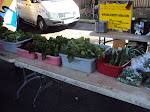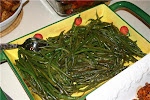Food and Health
The national hysteria over obesity has reached a crescendo this week, as the U.S. Centers for Disease Control and Prevention hosts the conference, "Weight of the Nation" in Washington, DC. If you couldn't make it, no worries, more fear-mongering is on the way in a four-part mini-series on HBO to air next week. http://www.foodsafetynews.com/2012/05/why-i-am-not-attending-or-watching-weight-of-the-nation/
According to several different surveys and sources in North America and Western Europe, the following ten foods are generally considered to be the most healthy: apples, almonds, blueberries, broccoli, oily fish, leafy green vegetables, sweet potatoes, wheat germ, avocadoes, and oatmeal. http://www.medicalnewstoday.com/articles/245259.php
It is a common misconception that the majority of our salt intake is due to a heavy handed sprinkling of salt from the table salt shaker. In fact, processed foods and restaurant meals contribute to upwards of 75 percent of our total daily sodium intake. http://www.supermarketguru.com/index.cfm/go/sg.viewArticle/articleId/1140
Five years after California started cracking down on junk food in school cafeterias, a new report shows that high school students there consume fewer calories and less fat and sugar at school than students in other states. http://well.blogs.nytimes.com/2012/05/08/bans-on-school-junk-food-pay-off-in-california/?ref=health
A new study has found that consumption of omega-3 fatty acids, plentiful in fish and nuts, is associated with lower blood levels of beta-amyloid protein. Amyloid plaques and tangles in the brain are characteristic of Alzheimer’s disease and are known to increase the risk for mental decline; blood levels of the protein may reflect levels of its deposits in the brain. http://well.blogs.nytimes.com/2012/05/07/more-omega-3s-less-of-a-protein-tied-to-alzheimers/?ref=health
Food Safety
The Food and Drug Administration has stopped the shipment of fresh and frozen oysters, clams, mussels and scallops from Korea to the U.S. because many of these molluscan shellfish may be contaminated, according to a news release from the Washington State Department of Health. The ban does not include canned shellfish. http://www.foodsafetynews.com/2012/05/fda-halts-shellfish-imports-from-korea/
While criticism of genetically modified foods has received widespread media attention in the past few years, consumers remain generally supportive of food biotechnology, according to an industry-funded survey released Thursday. The evaluation - conducted by the International Food Information Council (IFIC) - found that 38 percent of consumers have a somewhat or very favorable opinion towards plant biotechnology, up from 32 percent in 2010. A smaller 26 percent were neither favorable nor unfavorable, and 20 percent were either somewhat or very unfavorable. http://www.foodsafetynews.com/2012/05/consumers-trust-food-biotechnology-food-safety-survey-finds/
Food Assistance
The U.S. House voted to cut food stamps, federal workers’ benefits and other domestic programs to avoid scheduled reductions in defense spending. The chamber today passed, 218-199, a plan to cut about $310 billion in spending to replace automatic defense-spending reductions that lawmakers in both parties agree shouldn’t be allowed to take effect in January. Democrats lined up against the measure, H.R. 5652, saying it would put too much of the deficit burden on the needy. The proposal goes to the Democratic-controlled Senate, where it is doomed to failure. http://www.bloomberg.com/news/2012-05-10/house-votes-to-cut-food-stamps-to-avoid-defense-reduction.html
The federal government is spending $4 million to help hook up farmers and low-income customers. Currently, fewer than a quarter of the nation's roughly 7,100 farmers markets are set up to use the Electronic Benefit Transfer system, or food stamps. But Kathleen Merrigan, deputy secretary of agriculture, said she hopes these grants will bring another 4,000 of those outlets on line with the Supplemental Nutrition Assistance Program. http://abcnews.go.com/US/wireStory/farmers-markets-money-food-stamps-16308409
Farmers markets in Florida will soon be able to begin accepting food assistance cards, even if they lack telephone lines or electricity. The U.S. Department of Agriculture on Friday announced it was giving the state nearly $79,000 to help farmers markets purchase wireless equipment so they can handle purchases made with the electronic cards that have replaced food stamps. http://www.miamiherald.com/2012/05/12/2796035/fla-farmers-markets-to-take-food.html

























































































No comments:
Post a Comment